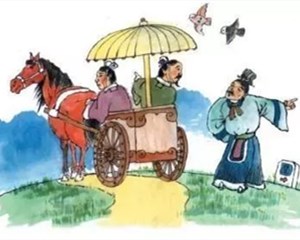译文:魏王准备攻打邯郸,季梁听到这件事,半路上就返回来,来不及舒展衣服皱折,顾不得洗头上的尘土,就忙着去谒见魏王,说:“最近我回来的时候,在大路上遇见一个人,正在向北面赶他的车,他告诉我说:‘我想到楚国去。’我说:‘您既然要到楚国去,为什么往北走呢?’他说:‘我的马好。’我说:‘马虽然不错,但是这也不是去楚国的路啊!’他说:‘我的路费多。’我说:‘路费即使多,但这不是去楚国的方向啊。’他又说:‘我的车夫善于赶车。’我最后说:‘这几样越好,反而会使您离楚国越远!’
这则寓言告诉我们,无论做什么事,都要首先看准方向,才能充分发挥自己的有利条件;如果方向错了,那么有利条件只会起到相反的作用。以上史事,形成成语“北辕适楚”,后来在流传过程中,人们习惯说作“南辕北辙”,并引申出另一个成语“背道而驰”,意义和“南辕北辙”相同。

《古代寓言·南辕北辙》
魏王欲攻邯郸。季梁闻之,中道而反,衣焦不申,头尘不去,往见王曰:
“今者臣来,见人于大行,方北面而持其驾。告臣曰:‘我欲之楚。’臣曰:‘君之楚,将奚为北面?’曰:‘吾马良。’臣曰:‘马虽良,此非楚之路也。’曰:‘吾用多。’臣曰:‘用虽多,此非楚之路也。’曰:‘吾御者善。’此数者愈善,而离楚愈远耳!……”
——《战国策》
The Wrong Direction
The Prince of Wei decided to invade Handan, the capital of the state of Zhao. Although Qiliang was on a journey when he heard this, he turned back at once and, without waiting to smooth his crumpled garments or brush the dust from his head, went to see the king.
"On my way back," he said, "I came across a man at Taihang Mountain, who was riding northwards. He told me he was going to the state of Chu."
"In that case, why are you heading north? " I asked him.
"That's all right," he replied. "I have good horses."
"Your horses may be good, but you're taking the wrong direction."
"Well, I have plenty of money."
"You may have plenty of money, bu this is the wrong direction."
"Well, I have an excellent charioteer."
"The better your horses," I told him, "the more money you have and the more skilled your charioteer, the further you will get from the state of Chu."
Warring States Anecdotes
更多精品翻译素材,敬请关注可可英语。












